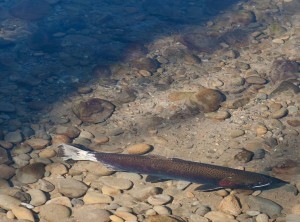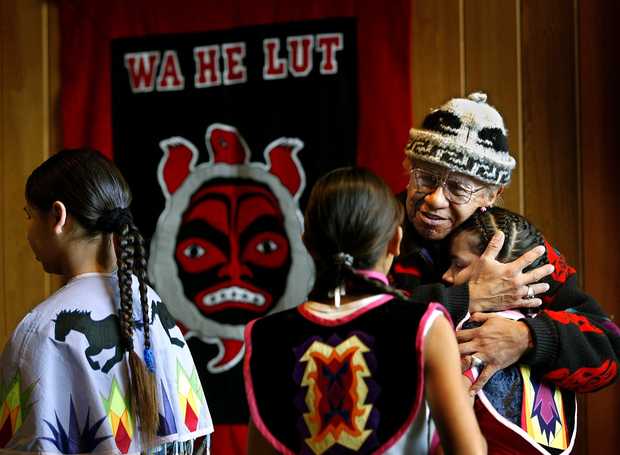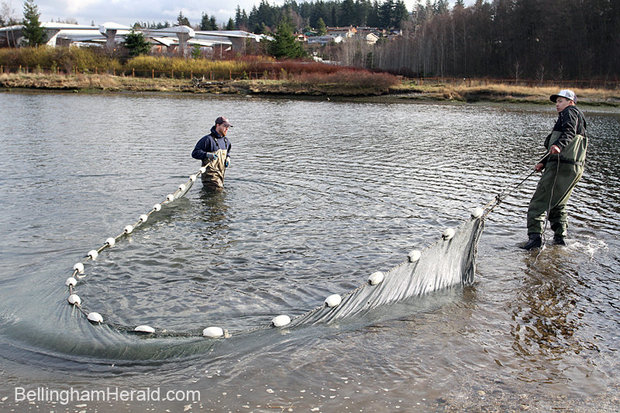Submitted by Ryan Miller, Environmental Liaison, Tulalip Tribes Natural Resources
ON THE TREATY FRONT: A series on the history and meaning of tribal sovereignty, treaty rights, environmental stewardship and issues that threaten these important rights. This is the second in a recurring series of articles produced by the Tulalip Tribes Treaty Rights Office to help educate and inform the membership. Our Mission is to “Protect, enhance, restore and ensure access to the natural resources necessary for Tulalip Tribal Members’ long-term exercise of our treaty-reserved rights.”
Indian Law: Understanding Treaty Fishing Rights
In treaties signed with the U.S. Government, our ancestors made great sacrifices by ceding millions of acres of land to the federal government in exchange for certain protections for our traditional and cultural values and ways of life. Article Five of the Treaty of Point Elliott guarantees the signatory tribes the right of taking fish at their usual and accustomed grounds and stations in common with all citizens as well as hunting and gathering roots and berries on open and unclaimed lands. Despite the federal government’s guarantees to tribes that they would be able to take fish as they always have, throughout the first half of the 20th century Indian fishermen faced fierce opposition to exercising this right from the State of Washington and non-Indian fisherman. These tensions led to battles in court, all of which contributed to the decision made by Judge George Boldt in US v Washington also known as “The Boldt Decision”, the foundational Indian treaty fishing rights case.
In 1905, the United States Supreme Court handed down the first decision addressing treaty fishing rights in U.S. v. Winans. In that case, the United States brought suit on behalf of the Yakima Nation against the Winans Brothers who, by attaining a permit for a fish wheel from the State of Washington had not only depleted the Yakimas’ fish supply but had also prevented them from accessing their traditional fishing grounds. The Supreme Court’s decision laid the foundation for the interpretation of treaties in the future and produced what was later called the “cannons of treaty interpretation”.
We have said we will construe a treaty with the Indians as “that unlettered people” understood it, and “as justice and reason demand, in all cases where the power is exerted by the strong over those to whom they owe care and protection”, and counterpoise the inequality “by the superior justice which looks only to the substance of the right, without regard to technical rules.”
The Supreme Court in US v Winans held that treaties are “not a grant of rights to the Indians, but a grant of rights from them and a reservation of those not granted”. The Supreme Court’s ruling states that issues of treaty interpretations must favor Indians as they were at a severe disadvantage during the negotiations which took place in a foreign language and often with the threat of violence. The court also notes that treaties must be interpreted the way the Indians of the time would have understood them. This idea is critical because our ancestors were deeply concerned about having access to all the places that they had always gathered and their concerns were heard by Governor Stevens who reassured them that they would always have access to their traditional places and resources.
I wish to speak my mind as to selling the land. Great chief! What shall we eat if we do so? Our only food is berries, deer, and salmon. Where then shall we find these? I don’t want to sign away my right to the land…..I am afraid that I shall become destitute and perish for want of food.
Hool-hol-tan, Skokomish leader speaking to Gov. Isaac Stevens at treaty negotiations 1855 (from article in Pacific Northwest Quarterly)
Governor Stevens responded to questions like these at all of the treaty negotiations,
You understand well my purpose, now you want to know what we desire to do for you. We want to give you houses and having homes you will have the means and the opportunity to cultivate the soil to get your potatoes and to go over these waters in your canoes to get your fish. We want more, if you desire to go back to the mountains and get your roots and your berries you can do so and you shall have homes and shall have these rights.
The courts determined that though the Winans Brothers acted lawfully by the standards of the State of Washington; they had violated the Yakima Nation’s treaty rights by restricting their access to traditional fishing grounds.
In 1942 Sampson Tulee, a member of the Yakima Nation, was convicted in the Superior Court of Klickitat County for catching salmon with a net without obtaining a license from the State of Washington. Tulee appealed to the Supreme Court on the grounds that the Washington State statute violated his treaty right. The court, in Tulee v. Washington, held that while the State of Washington had the right to regulate Treaty fishing outside the reservation for the conservation of species, it could not charge a fee to Indians for the license required.
We believe that such exaction of fees as a prerequisite to the enjoyment of fishing in the ‘usual and accustomed places’ cannot be reconciled with a fair construction of the treaty. We therefore hold the state statute invalid as applied in this case…It is our responsibility to see that the terms of the treaty are carried out, so far as possible, in accordance with the meaning they were understood to have by the tribal representatives at the council and in a [315 U.S. 681, 685] spirit which generously recognizes the full obligation of this nation to protect the interests of a dependent people.
While these cases represent “wins” for treaty tribes and their members they are also directly reflected in the decision of Judge Boldt in US v Washington. Over 100 years after the signing of the treaty and years of conflicts over treaty fishing, the U.S. sued the state of Washington in 1970 on behalf of Washington’s treaty tribes.
Stay tuned for our next article which will focus on the landmark Indian Law case US v Washington and other treaty fishing decisions all the way through to the culvert case.

 Apr 7th, 2014
Apr 7th, 2014


